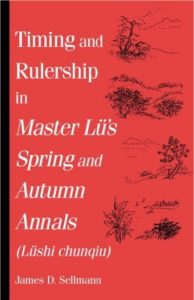Qin state Chancellor Lü Buwei, who was both a prominent merchant and a politician active during the late period of China’s Warring States era, instructed over two thousand guests residing in his house to record what they saw and heard. The book that was thus compiled was titled “Lüshi Chunqiu(Master Lü’s Spring and Autumn Annals)” (呂氏春秋). It originated from the belief that although there may not be completely white foxes in the world, it is possible to make a completely white fox fur coat by selecting only the white fur from such foxes. Lü Buwei sought to integrate the thoughts of various schools of philosophy, including Confucianism, Taoism, Legalism, Mohism, Yin and Yang, and military strategy, into a unified philosophy. It could be considered the world’s first knowledge portal.

The Lüshi Chunqiu (呂氏春秋) is an encyclopedic Chinese classic text compiled around 239 BC under the patronage of late Qin state Chancellor Lü Buwei, some years before the unification of China as the Qin dynasty. In the evaluation of Michael Carson and Michael Loewe, “The Lü shih ch’un ch’iu is unique among early works in that it is well organized and comprehensive, containing extensive passages on such subjects as music and agriculture, which are unknown elsewhere. It is also one of the longest of the early texts, extending to something over 100,000 words.
The book contains the saying, “Those who wish to conquer others must first conquer themselves.” Living in this world means both battling with others and battling with oneself. The Western philosopher Plato also once said, “The greatest victory is over oneself.” When Napoleon was exiled to the island of Saint Helena after the failure of his Russian campaign, he confessed, “My failures are all my fault. I am my own greatest enemy and the cause of my miserable fate.” It speaks to the idea that the greatest enemy lies within our own hearts.
In November 1905, the Eulsa Treaty was forced upon Korea by Japan in an attempt to strip Korea of its diplomatic rights. This treaty consisted of five articles, and ironically, five individuals who were involved in this unequal treaty were dubbed the “Five Thieves” by the people of the time. In other words, they were considered the greatest thieves of their time for stealing their own country and selling it to others.
During Park Chung-hee’s dictatorship, poet Kim Ji-ha regarded conglomerates, members of parliament, high-ranking government officials, generals, ministers, and vice ministers as the contemporary Five Thieves. Such adversaries exist everywhere, in every era. Therefore, Kim Ji-ha’s Five Thieves continued to exist, albeit in slightly different forms. Kim Tae-dong, who was an economic adviser to President Kim Dae-jung, labeled the media, legal circles, land speculators, environmental destroyers, and public officials as the contemporary Five Thieves, also calling them “thieves of words, thieves of law, thieves of land, environmental thieves, and public thieves.”
However, each of us also harbors such adversaries within ourselves. These adversaries diminish our competitiveness and hinder our growth. Therefore, the battle against them takes precedence over any other competition. Moreover, those who are beginning to learn about life may need to confront these adversaries even before their desks. Successful individuals are those who have successfully subdued these adversaries.
What are our adversaries? While it may vary from person to person, arrogance, impatience, anger, laziness, and greed are commonly considered adversaries that ordinary people must overcome. Overcoming these internal adversaries makes winning in external competitions much more achievable.
Perhaps the most frightening thief is arrogance. An episode related to “Master Lü’s Spring and Autumn Annals” illustrates the pinnacle of arrogance. Lü Buwei once advertised offering a thousand pieces of gold to anyone who could add or subtract even a single character from “Master Lü’s Spring and Autumn Annals.” Most people today would likely be able to claim such a reward.
Arrogance stems from overestimating one’s abilities. Such arrogance often accompanies a sense of having nothing more to learn, thus rejecting change. Napoleon’s pride and stubbornness also contributed to the failure of his Russian campaign. Despite having the willpower, Napoleon could have easily incited Russian peasants to rebel and join his side. Yet, he insisted on subduing Russia solely with his military might. Moreover, he disregarded Russia’s negotiation proposals and instead occupied empty cities. The result was a colossal failure.
The hallmark of arrogant individuals is their firm belief that their past successes were solely achieved through their efforts and abilities. As mentioned earlier, our successes were made possible by the environment and the people who supported us. While strategies for winning competitions played a role, luck and favorable circumstances also played significant parts. Successful individuals must ask themselves, “What circumstances led to my success?” and “Who supported me in my success?” or, they should.
Businesses fail primarily due to arrogance or conceit. Managers who deem themselves successful easily become intoxicated by their success. Indulging in such conceit eventually leads a company down the path of decline.
The first step in the competition against oneself is recognizing one’s inadequacy. Arrogance refuses this recognition. Instead, when faced with failure, arrogant individuals blame their surroundings. The true cause of failure lies within one’s own heart, but the individual remains oblivious to it. Success requires no explanation, but failure demands feeble excuses, mostly blaming others.
Arrogant people are lazy in their efforts for change. Arrogance might be a trait of those who fear change. Change requires the will to try new things and learn for them.
The second thief is anger. Easily getting angry and expressing rage makes it impossible to think rationally. Anger not only diminishes one’s competitiveness but also easily inflicts hurt on others. Thinking that one’s surroundings are part of one’s competitiveness is also a self-destructive attitude.
When people are excited, it’s difficult for them to make rational judgments. There’s a tale of Genghis Khan being prevented from drinking water by his trained falcon when he tried to drink water flowing from between rocks on his way back from hunting. Angered, Genghis Khan killed his beloved falcon with a knife. When he looked back to drink water again, he noticed a dead viper decaying in the stagnant water within the rocks. He realized that his clever and loyal falcon had prevented him from drinking poison. He made the following resolution:
“From now on, I will not make any decisions when I am angry.”
Especially in situations where emotions strongly influence decisions, such as when one is angry or sad, making regrettable choices is something everyone experiences. Reason clashes with passion and losing rationality can easily lead to falling into the trap of choices. Anger is often synonymous with fear. Both individuals and businesses tend to act impulsively when they believe they are in dire straits. When stuck in water, staying still would naturally lead to floating, but struggling in panic will only make one sink deeper. Instead of fear, one should first think of words that lead to solutions. That word could become an herb, allowing our subconscious to focus on finding solutions.
Franz Kafka, the Czech-born German novelist, attributed impatience and laziness as the primal sins of humanity. Because of impatience, Adam and Eve ate the forbidden fruit and were expelled from Eden, and because of laziness, they couldn’t return to paradise. Laziness always has a rational basis. Even in very bad situations, it clings more to positive evidence and ignores external warnings. It refuses to move while blaming the surroundings, even in unfavorable situations. To win in competition, one must first think of strategies but demand swift execution. Even if victory cannot be achieved in one move, more information about the opponent can be obtained, naturally leading to better strategies and a favorable position for the next move.
That being said, it doesn’t mean we should act hastily. Our impatience is also an adversary that we must always be cautious of. While laziness is not acceptable and impatience is not advisable, this may seem contradictory, but such is life. We can never know the exact optimal point, but both excess and deficiency can be problematic. Finding the most suitable point for ourselves is the essence of moderation.

The Earth’s seasons exist due to the Earth’s tilt of 24.3 degrees. Similarly, Saturn tilts at 26.73 degrees, resulting in changes like spring, summer, winter, and autumn. The difference lies in the duration of each season. One season on Earth lasts about three months. However, on Saturn, spring lasts for approximately seven years. To prepare for the next spring, one must wait for 21 years. Most of us experience dozens of springs, autumns, summers, and winters. Knowing that summers are hot, and winters are cold, we can only prepare. Otherwise, we might postpone it until the next spring. But if we were living on Saturn, our lives and investment behaviors would have to be very different. This is because it takes 29 years for one season to complete on Saturn. This means that summer lasts for roughly seven years.
In fact, if we were currently living in Saturn’s summer, it would be difficult to explain or feel the past winter. Try to recall your childhood memories from 20 years ago. You may only be able to remember a few enjoyable and challenging events. Nonetheless, if you are confident that spring will come again in 29 years, anyone will prepare for it.
Our lives are similar. Opportunities that seem unlikely to come again are often given another chance. Or if one is not prepared at the present, the current opportunity may not be theirs. Opportunities are not only given from the outside; opportunities must also be seized. When I am prepared and the external environment is right, opportunities arise. It’s a story of preparing and waiting.
Rushing in without thinking is also a phenomenon that occurs because one only thinks of their own purpose without considering the consequences. It’s a recklessness driven by greed, without considering the price one has to pay. There’s a saying, “It’s easy to defeat enemies in the mountains, but it’s hard to rid oneself of selfish desires.” Without ambition, there is no growth. However, having ambitions beyond one’s abilities or efforts always comes with a price.
Everyone harbors at least five types of thieves in their hearts. In addition to the adversaries mentioned above, if we already have bad habits, this is also an obstacle we must overcome. To gain competitiveness, we must first suppress these adversaries. Laozi taught, “A person who defeats others has strength, but a person who defeats oneself is even stronger.”
Adversaries are not exclusive to us; it’s likely that our opponents also have their weaknesses. Throughout history, strategies such as fostering arrogance, provoking anger, and exploiting greed have been effective tactics in competition, and they remain relevant even today.


답글 남기기